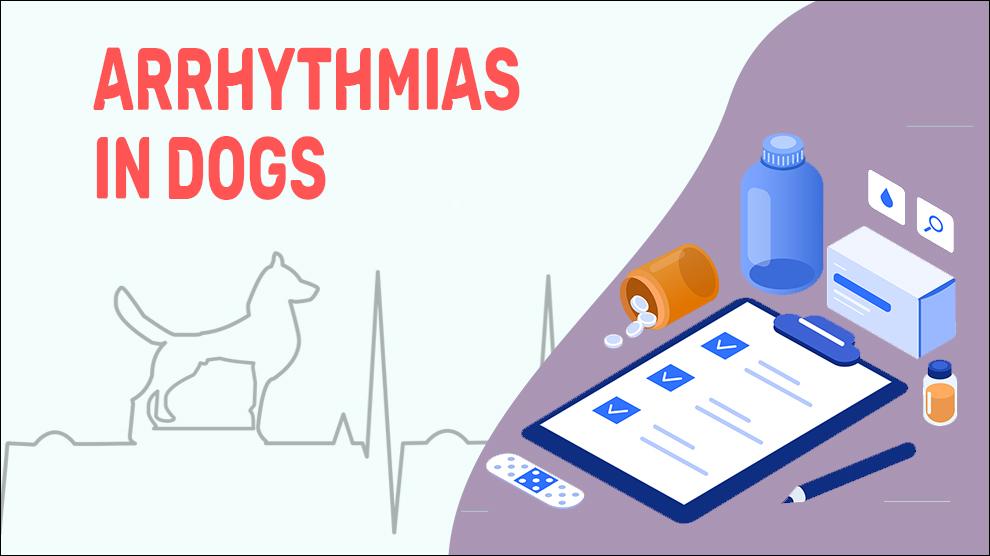What Is Arrhythmias In Dogs?
What is an arrhythmia?
Simply defined, arrhythmia in dogs is an irregularity in the rhythm of the heart, which consists of the strength, speed or regularity of heartbeats. Any type of abnormal electrical activity pattern in the heart muscles or variance of a normal heart rate or rhythm in dogs is considered canine arrhythmia.
Arrhythmia is classified based on the area of the heart in which they originate. This isn’t always something to worry about in dogs. This condition is quite common in all dogs at some point in their lives.
About 10% of all dogs have cardiovascular disease. Just like their human companions, the incidence of heart disease increases dramatically with age.
Many dogs live absolutely normal lives without showing any health issues or related symptoms; then again, sometimes irregular heartbeats may cause worrisome —even life-threatening — signs and symptoms.
If you suspect your dog has irregular heartbeats regularly, especially if he shows serious symptoms, for peace of mind, take him to your veterinarian.
What Are The Symptoms Of Arrhythmias In Dogs?
Symptoms of canine arrhythmia include:
- Weakness
- Collapse
- Slow/fast/erratic heart rate
- Exercise intolerance
- Labored breathing
- Lack of appetite
- Increased respiratory rate
How Is Arrhythmias In Dogs Treated?
Mild arrhythmias do not necessitate treatment, and they spontaneously convert to normal.
Other arrhythmias are severe and need treatment, options of which include:
- Sinus arrhythmia Medications: Mexiletine or Atropine
- Atrial fibrillation: Dilitiazem, beta-adrenergic blockers such as atenolol, calcium-channel blockers such as diltiazem and Digoxin (Lanoxin, Toloxin)
- Atrioventricular block – Propantheline or Theophylline
- Second degree AV block and third-degree AV Block is Pacemaker Implantation
- Ventricular tachycardia– Mexiletine, Lidocaine and Sotalol
- Premature beats - Sotalol or Mexiletine
- Congestive heart failure - An angiotensin-converting enzyme (ACE) inhibitors (benazepril, lisinopril or enalapril), diuretics like spironolactone, furosemide, etc. Extra medications that might be used are sildenafil, valsartan/ sacubitril/, torsemide
Home Remedies For Arrhythmias In Dogs
Keep in mind natural remedies may not clear the problem, but they may help to reduce some of the symptoms. You can always ask any herbs and supplements that can be included in treatment regimen for arrhythmias as an aid to the medical protocol.
Herbs: Ginger, Hawthorn, Dandelion, Parsley, Cayenne
Dietary Supplements:
- Carnitine-rich foods
- L-Taurine
- Coenzyme Q10
- Magnesium and Selenium
- Vitamins A, B6, C, and E
How To Prevent Arrhythmias In Dogs?
There are no dependable methods to prevent heart disease in dogs, particularly since few of the common types are hereditary. But you can take steps to help your dog live a healthy life.
Healthy diet: Always feed your pup a healthy diet that includes Omega-3 Fatty Acids (fish oil) and Taurine (amino acid).
Adequate exercise: Exercise is good for cardiac health. However, when your pup has been diagnosed with heart disease, make sure to limit strenuous exercises.
Parasite preventatives:Flea and tick preventatives such as heartworm preventatives.
Dental care:Dental diseases have a strong association with heart diseases, so dental health should be a top priority for pet owners.
What Dogs Get Arrhythmias?
Dachshund, Boxer, Doberman Pinscher, Golden Retriever, Boston Terrier, Cavalier King Charles Spaniel, Chihuahua, Fox Terrier, Miniature Pinscher, Miniature Poodle, Toy Poodle, Miniature Schnauzer, Pekingese
Cause And Types Of Arrhythmias In Dogs
- Causes
- Cardiac causes of arrhythmias include: congenital heart defects (especially patent ductus arteriosus, subaortic stenosis), Heart muscle disease (such as hypertrophic cardiomyopathy, arrhythmogenic right ventricular cardiomyopathy, dilated cardiomyopathy, etc), myocarditis (inflammation of the myocardium), severe valve leakage and enlargement of the cardiac chambers (chronic degenerative mitral valve disease), trauma to the heart muscle (such as a dog being hit by a car), and age-related changes.
- Non-cardiac causes of arrhythmias include: inflammation of the pancreas, severe anemia (low red blood cell count), gastric dilatation-volvulus (stomach twists around filled fills with large amounts of air), low blood magnesium, neurologic disease (i.e. brain tumors), diseases of the spleen, liver or GI tract, muscular dystrophy, endocrine disease (i.e., of the thyroid gland, adrenal glands); anesthetic agents, toxins and medications.
- Several types of arrhythmias may occur. Some of the more common ones include:
- Atrial tachycardia
- Atrial fibrillation
- Ventricular tachycardia
- Ventricular fibrillation
- Ventricular premature complex
- Ventricular escape rhythm
- First-degree/ Second-degree/ Third-degree heart block
When To See A Vet For Arrhythmias In Dogs?
The prognosis is unpredictable depending on the underlying heart conditions and the type of rhythm disturbance.
Most of the arrhythmias are benign and when it is not considered as a threat, it does not require treatment.
The prognosis for ventricular fibrillation is serious, and death follows if not treated immediately.
Vet will run tests to find out whether the abnormality in heart beat is a problem that requires treatment or not.
Food And Diet For Arrhythmias In Dogs
- Use no salts in food or cooking.
- Canned, frozen, and prepared pet foods are high in sodium.
- Fresh meats are usually low in sodium.
The mainstays of a good low-sodium diet maybe chicken, fresh beef, pork, bland macaroni, and/or low-sodium.
ACCEPTABLE FOODS (no salt!)
Conclusion
Arrhythmia treatment course depends on the severity and type of irregularity in heart rhythm present.
Mild Arrhythmia usually does not require treatment.
More serious, fast rhythm disturbances can be treated with either medications or, in some cases, curative catheter-based procedures.
Pacemaker implantations can be used for severe, slow heart rhythm irregularities.
However, it is significant to also treat any coexisting, underlying structural heart disease or outside of the heart diseases that are contributing to the abnormalities in heart rhythm.

















